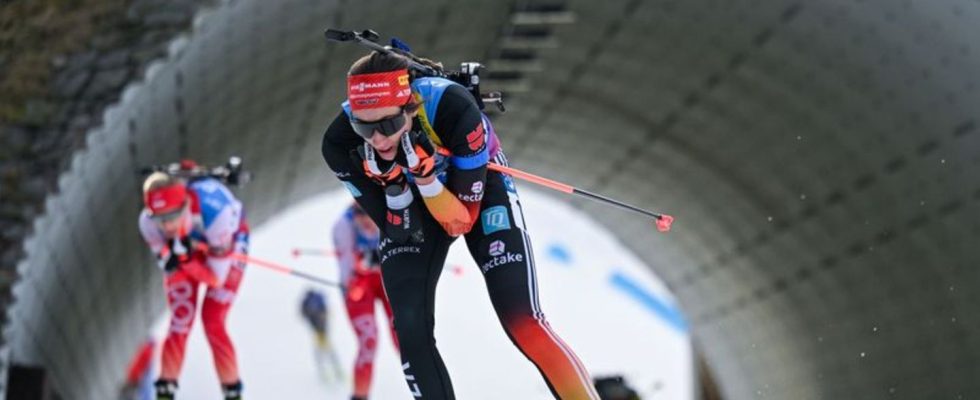Biathlon World Cup
Only three medals: But “not everything bad” for the DSV team
Vanessa Voigt came fifth in the mass start. photo
© Hendrik Schmidt/dpa
The conditions in Nove Mesto were not for the Germans. The biathletes went home with three World Cup medals. Not a brilliant achievement, but not a disaster either.
While the new record world champion Johannes Thingnes Bö picked up his 20th gold medal, but the German biathletes only had to play the role of spectators at the last award ceremonies.
Vanessa Voigt in fifth place and Philipp Nawrath in tenth place in the final mass starts revealed on the last day of the World Championships in Nove Mesto: Just at the highlight of the season, the German team was not in the top shape they had hoped for, neither in terms of material nor in terms of sport.
Voigt could be very satisfied with her error-free shooting. But on the trail it felt “like on a plane, those at the front in business class and us in second class. You struggle and just can’t keep up,” said the 26-year-old, but also criticized herself: “Maybe we have nor the outstanding form.”
Not all hopes come true
The individual silver for Janina Hettich-Walz and bronze for the women’s relay and Benedikt Doll in the individual are not a crash landing. But only three of 28 possible medals – and for the first time since 2021 no gold at a major event – amount to a certain disillusionment, as expectations were justifiably high after five World Cup victories and a further 15 podium places.
“It wasn’t a debacle, and I don’t want to let it all be talked down to me. But clearly, with the previous successes, we expected a little more. There’s nothing to talk about,” said sports director Felix Bitterling. But it was “absolutely not all bad”, especially since, like last year, they won three medals in Oberhof – and Denise Herrmann-Wick, who has since resigned, was there at that time. Nevertheless, Bitterling also said: “We are certainly not among the best.”
Surprising success stories
Hettich-Walz’s first World Cup medal and Doll’s third place will be remembered positively. The success of the relay was also a bit of a surprise after Franziska Preuß was out for a short time. Sophia Schneider, who was almost on the bus heading home, did a great job as a substitute. In addition, the 19-year-old World Cup debutante Selina Grotian made people sit up and take notice with fourth place in the individual and a good relay performance. Of the men who previously had four victories this season, only Doll took advantage of the opportunity in what was probably his last World Cup appearance. Fourth place in the relay was a disappointment after being on the podium in all races. Dominator Bö meanwhile drew level with his compatriot Ole Einar Björndalen with his third gold in the Czech Republic and, like last year in Oberhof, was on the podium in all seven races.
In the Vysocina Arena, where a total of more than 200,000 fans created an incredible atmosphere for twelve decisions, many factors came together for the Germans. Neither the day’s form with shooting and running performance nor the mental strength were consistent, and the necessary bit of luck was also missing from time to time.
Failed search for the unicorn
But one topic outshone the nine days of competition: In the material battle after the fluorine wax ban, the German technical team did not find the perfect skis despite tireless work in the prevailing plus temperatures – and that despite sufficient financial resources and manpower.
Except for the two successful individual races, where the temperatures were slightly lower, the DSV team was not competitive on the cross-country ski trail in these conditions. “It was really a fight here every day,” said Hettich-Walz (27).
In Nove Mesto, six technicians were on site in two wax trucks, and three colleagues from the Oberhof technology center came with a mobile grinding machine for the World Cup.
Even small nations like Estonia and Finland kept up. “They’ve probably just found something. After the World Cup, there are still three World Cups left, so we’ll be there again,” hopes Doll. Meanwhile, mass start world champion Justine Braisaz-Bouchet raved about the French’s perfect material over the entire two weeks – the team won the nations championship with six gold medals and seven more.
A solution must be found. Conditions like those in Nove Mesto, with consistently high temperatures and rain, as well as a resulting dirty artificial snow track in the middle of a green-brown landscape, will probably be the standard rather than the exception in the future. The climate crisis is causing decreasing snow reliability and increasingly shorter cold periods in many places in the low mountain ranges. The world association IBU is therefore working on future concepts. The program has been finalized until the 2025/2026 season; the first adjustments will probably only be made in the period up to 2030. Even then, a revolution is still not to be expected, we hear.

